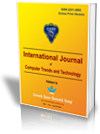Sentiment Analysis Using Twitter Data

MLA Style:Remya B Nair, Sruthimol E K"Sentiment Analysis Using Twitter Data" International Journal of Computer Trends and Technology 67.5 (2019): 82-84.
APA Style:Remya B Nair, Sruthimol E K (2019). Sentiment Analysis Using Twitter Data International Journal of Computer Trends and Technology, 67(5), 82-84.
Abstract
Sentiment analysis is the process of computationally identifying and categorizing opinions expressed in a piece of text. Sentiment analysis is also known as opinion mining. It is a field with natural language processing that builds system that try to identify and express opinions within the text. In this paper we are using twitter data for analysing sentiments. Tweets are collected from twitter using twitter API, analyses and classifies these tweets. Naive Bayes classifier is used for classifying tweets in order to obtain the result as positive, negative or neutral.
Reference
[1] Neethu M S & Rajasree R, “Sentiment analysis in twitter using machine learning techniques,”.4th ICCCNT 2013 July 4 - 6, 2013, Tiruchengode, India
[2] Manju Venugopalan & Deepa Gupta, “Exploring sentiment analysis on twitter data,” in Proceedings of the 11th International Conference on Electronic Publishing, pp. 349–360, 2007.
[3] Harpreet Kaur,Veeenu Mangat & Nidhi“A survey on sentiment analysis technique,”978-1-5090-3243-3/17/$31.00 ©2017 IEEE
[4] Boiy, Erik, and M. F. Moens. "A machine learning approach to sentiment analysis in multilingual Web texts." Information Retrieval Journal12.5(2009):526-558.
[5] Davidov, Dmitry, O. Tsur, and A. Rappoport. "Semi-supervised recognition of sarcastic sentences in twitter and amazon." Conll(2010):107-116.
[6] Preslav Nakov, Alan Ritter, Sara Rosenthal, Fabrizio Sebastiani,Veselin Stoyanov, SemEval-2016 Task 4: Sentiment Analysis in Twitter.
[7] Gamallo, Pablo, and M. Garcia. "Citius: A Naive-Bayes Strategy for Sentiment Analysis on English Tweets." International Workshop on Semantic Evaluation 2014:171-175.
[8] Kang, Hanhoon, S. J. Yoo, and D. Han. "Senti-lexicon and improved Naïve Bayes algorithms for sentiment analysis of restaurant reviews."Expert Systems with Applications An International Journal39.5(2012):6000-6010.
Keywords
Sentiment analysis, naïve Bayes, polarity, tokens, unigram, chi-square


